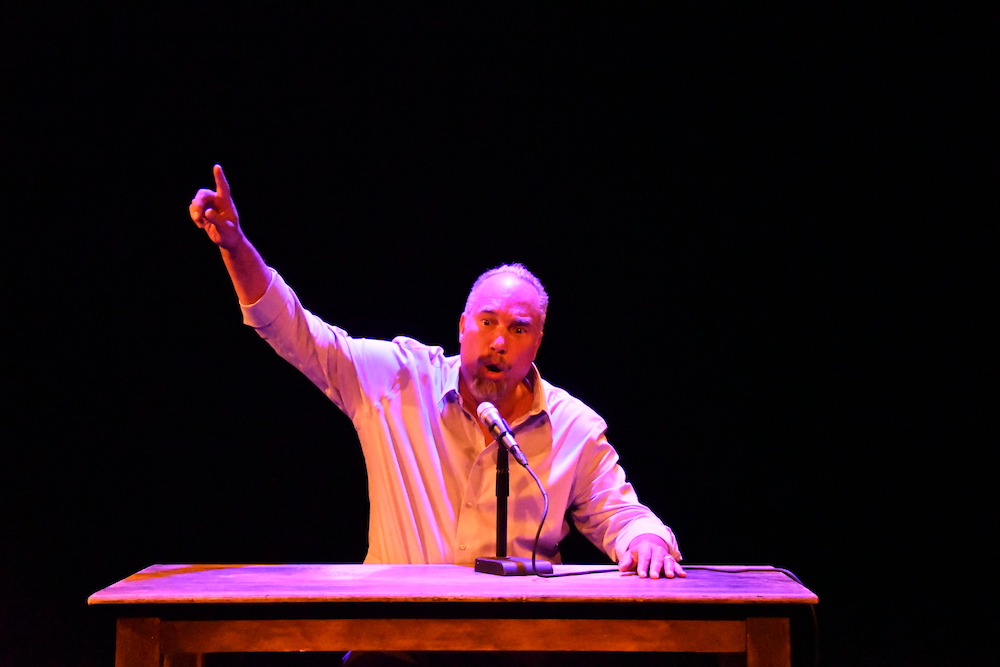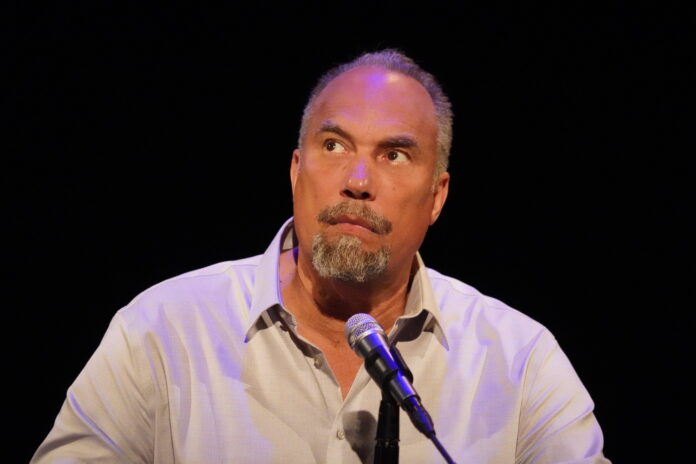If you’re going to see a solo show by Roger Guenveur Smith—described by Magic Artistic Director Sean San José as having done “more Spike Lee flicks than anybody else”—there’s one thing to keep in mind: No matter how well his characters subjects (Huey P. Newton, Frederick Douglass) are defined by specific eras, Smith makes them literally timeless. Their minds have transcended the confines of the period in which they lived, allowing them to make anachronistic commentary on events they couldn’t possibly have known about in their lifetimes.
That’s the point. The struggles these people went through haven’t been, for lack of a better word, “solved” in the years since their deaths. Smith draws clear parallels between his subjects, those who came before, and those who came after. Their pain is a shared pain. So, when his version of Anne Frank’s German-Jewish, Holocaust-surviving father in “Otto Frank” (through March 27 at Magic Theatre), sees Bree Newsome tear down a Confederate flag, it’s no wonder he so easily relates to the struggle for freedom and acceptance.
Otto Frank’s adult years were defined by tragedy: fighting in the first World War; forced into hiding from the Nazis; being separated from his family; learning of their deaths after the fact; being accused of exploiting their story—his story—for profit. The years leading up to his death were so defined by sadness that it’s no wonder Smith spends the entire one-hour running time appearing as if he’s on the verge of tears. The microphone before him amplifies his voice only so much above a whisper. What else would you expect from a man who’s seen humanity at its absolute worst.

One thing you’ll notice during the course of the show is that of all the names he mentions—Billie Holiday, Audrey Hepburn—the most noticeable is the one he doesn’t. “I gift you this little checkered book,” he says to his young daughter on her birthday. For any other parent, this would be a way to encourage a child to always have an outlet to let their thoughts run free. For an Otto outside of time, it’s the chronicle that will expectedly put a face on the human casualties of a new World War.
Even when the diary achieves great acclaim, Otto is too grief-stricken to attend the mass media premieres it generated on Broadway or in Hollywood. Regarding the latter, he recalls defending to other Jews the choice to cast non-Jew Audrey Hepburn as his late daughter. It’s the story that matters to him. It’s the story that needs to be told. He calls out contemporary white supremacists—“with their tiki torches” and new swastikas—as just one reason why the story of his daughter needs to be told.
Lest I forget to mention it, all of this occurs on a near-empty Magic Theatre stage. The all-black design smacks of an endless void, illuminated by a single spotlight (Alejandro Acosta’s lights also integrate subtle color shifts, as designed by Kirk Wilson). The only set piece (by Brittany White from another Wilson design) is a wooden table, centerstage with a wooden chair in front of it and a corded microphone on it. It looks as if it was designed for police confession rather than the recorded memoir of a man whose life was shattered.
Guiding our lead through the sea of his own memories are the aethereal sounds of musician Marc Anthony Thompson. Falling somewhere between “New Age soundscape” and “horror film,” the score is as elusive as the timeline of the play itself. It never distracts and often disappears so subtly that its equally subtle return is both a surprise and not. As with the rest of the show, the music doesn’t need to be a spectacle to be effective.
As with the acclaimed “A Huey P. Newton Story,” the Berkeley-born Smith originated “Otto Frank” with The Magic. “Friday the 13th of March,” he told us this night, was when this show was first cancelled in 2020 due to shutdowns. Two years later and the show is no less relevant than it was then. Point of fact: given the civil rights events since and the threat of world war right now, the show may not have been delayed so much as postponed until its appropriate time.
OTTO FRANK runs through March 27 at the Magic Theatre in Fort Mason Center, SF. Tickets and information here.







